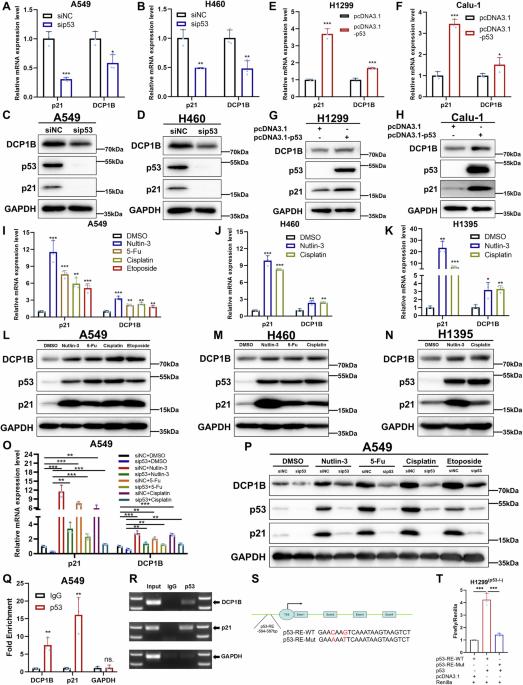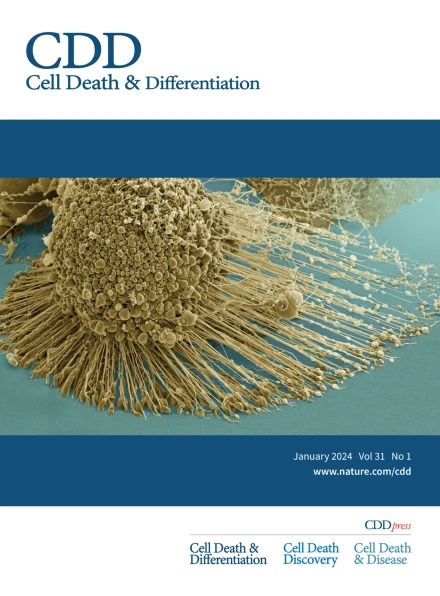在非小细胞肺癌中,p53通过转录激活DCP1B抑制肿瘤进展,增强肿瘤对PI3K阻断的敏感性
IF 15.4
1区 生物学
Q1 BIOCHEMISTRY & MOLECULAR BIOLOGY
引用次数: 0
摘要
非小细胞肺癌(NSCLC)约占肺癌患者的 85%,其特点是侵袭性强、预后差。在这项研究中,我们发现解旋 mRNA 1B (DCP1B) 是一种受 p53 转录调控的抑癌基因。研究发现,DCP1B 可抑制 NSCLC 细胞的生长和迁移。一致的是,DCP1B 在 NSCLC 组织中的表达水平降低,而其低表达与 NSCLC 患者的不良预后相关。机理研究发现,DCP1B 可促进丝裂原活化蛋白激酶 4(MAPK4)mRNA 的周转,而 p53 的激活可通过 DCP1B 部分降低 MAPK4 的表达水平。值得注意的是,MAPK4 的过度表达可以驱动 AKT 磷酸化,而不依赖于磷酸肌酸 3-激酶(PI3K),从而中和了 PI3K 抑制剂在 NSCLC 细胞中的抗肿瘤活性。此外,p53 激动剂与 PI3K 抑制剂联合使用可在体外和体内协同抑制 NSCLC 增殖。总之,这项研究不仅揭示了p53-DCP1B-MAPK4轴在抑制NSCLC进展中的功能和机制,还提出了一种治疗NSCLC的有前景的联合策略。本文章由计算机程序翻译,如有差异,请以英文原文为准。


p53 transcriptionally activates DCP1B to suppress tumor progression and enhance tumor sensitivity to PI3K blockade in non-small cell lung cancer
Non-small cell lung cancer (NSCLC), which accounts for approximately 85% of lung cancer patients, is characterized by its aggressive nature and poor prognosis. In this study, we identify decapping mRNA 1B (DCP1B) as a tumor suppressor gene that is transcriptionally regulated by p53. DCP1B is found to inhibit the growth and migration of NSCLC cells. Consistently, the level of DCP1B expression is decreased in NSCLC tissues, and its low expression is associated with NSCLC patients’ unfavorable outcomes. Mechanistic investigations reveal that DCP1B promotes the turnover of mitogen-activated protein kinase 4 (MAPK4) mRNA, and the activation of p53 reduces the expression level of MAPK4 partially through DCP1B. Notably, overexpression of MAPK4 can drive AKT phosphorylation independent of phosphoinositide 3-kinase (PI3K), thus neutralizing the anti-tumor activity of the PI3K inhibitor in NSCLC cells. Moreover, the p53 agonist combined with the PI3K inhibitor can suppress NSCLC proliferation synergistically in vitro and in vivo. Collectively, this study not only uncovers the function and mechanism of the p53-DCP1B-MAPK4 axis in suppressing NSCLC progression but also suggests a promising combination strategy for treating NSCLC.
求助全文
通过发布文献求助,成功后即可免费获取论文全文。
去求助
来源期刊

Cell Death and Differentiation
生物-生化与分子生物学
CiteScore
24.70
自引率
1.60%
发文量
181
审稿时长
3 months
期刊介绍:
Mission, vision and values of Cell Death & Differentiation:
To devote itself to scientific excellence in the field of cell biology, molecular biology, and biochemistry of cell death and disease.
To provide a unified forum for scientists and clinical researchers
It is committed to the rapid publication of high quality original papers relating to these subjects, together with topical, usually solicited, reviews, meeting reports, editorial correspondence and occasional commentaries on controversial and scientifically informative issues.
 求助内容:
求助内容: 应助结果提醒方式:
应助结果提醒方式:


